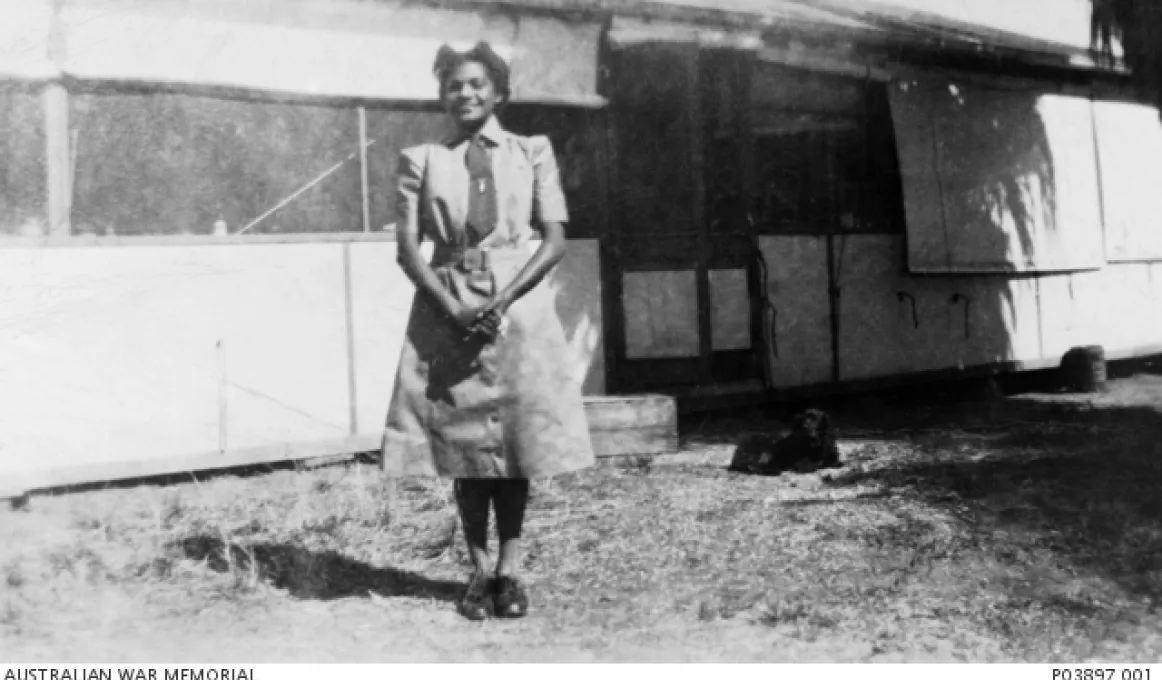Remembrance Day – Faith Bandler (1918-2015)

‘… we must never fail to remember the terrible destruction of human life…’
This story is an extract from: Lachlan Grant with Michael Bell, For Country, For Nation: an illustrated history of Aboriginal and Torres Strait Islander military service (Canberra: Australian War Memorial, 2018).
It is reproduced here with permission of the authors.
‘We had to win the war’
‘Well, I read in an evening paper … there was a need for women … and they could go to Martin Place and there they could enlist in the Australian Women’s Land Army … I was determined that I should do something. Something in a very positive way, because it was a war against fascism and I was aware I was very aware that Jewish people were coming to Australia and that the Nazi Party had grown. That the Nazis had walked into Czechoslovakia and Austria and that thousands of Jews were in concentration camps. I was no fool, I realised what it was all about and … I went in because I thought we’d have fascism here …’ Faith Bandler
Future civil rights campaigner Faith Bandler (née Mussing) was the daughter of a South Seas Islander forcibly removed from Vanuatu to work in a sugar cane plantation in Queensland in the 1880s (a practice known as “blackbirding”). She holds a special place amongst Australia’s Indigenous communities as a driving force and public face of the “yes” campaign during the 1967 referendum to include Aboriginal Australians on the census.
In 1942, not long after her brother had become a prisoner of war following the fall of Singapore, Faith joined the Australian Women’s Land Army (AWLA) which provided agriculture labour to fill wartime shortages. Farm work was tough, but the thought of the soldiers overseas drove Faith on:
‘I can recall again and again in the terrible heat in the open, under a cloudless sky in the middle Summer, weeding acres and acres of carrots for a pittance and I could only do that because my mind was very much with the men who were at war. Particularly, those who were in the tropics, and I guess it was that, that kept me constant. I couldn’t have stopped weeding those carrots however rotten the conditions were … because we had to win the war, we had to win the war!’
After the war she learned that her brother Edward, who served in the 2/26th Battalion, did not survive captivity. He had died during the construction of the Burma–Thailand Railway on 7 July 1943. In the years after the war, Faith visited Europe with her husband where she was struck by the destruction still evident. She reflected that:
‘It convinced me that whatever we fail to do, we must never fail to remember the terrible destruction of human life … It must never happen again … I feel that way now, I feel I’ve seen it and I didn’t experience it, all I experienced were the heat and the flies and the discomforts and the cold and the frosts. It wasn’t awfully much, but I’m glad to be able to say that I did have those … that experience and that was MY contribution towards those who set out to destroy the world.’
Find out more
‘Faith Bandler was the daughter of Pacific Islander, Peter Mussing, brought to Queensland from the island of Ambrym in the then New Hebrides (now Vanuatu) and an Australian-born mother, Ida Venno, of Indian-Scottish descent.’ (The Encyclopedia of Women & Leadership in the Twentieth-Century Australia)
All above quotes from Faith Bandler, Interview, 8 August 1986, AWM S02772.